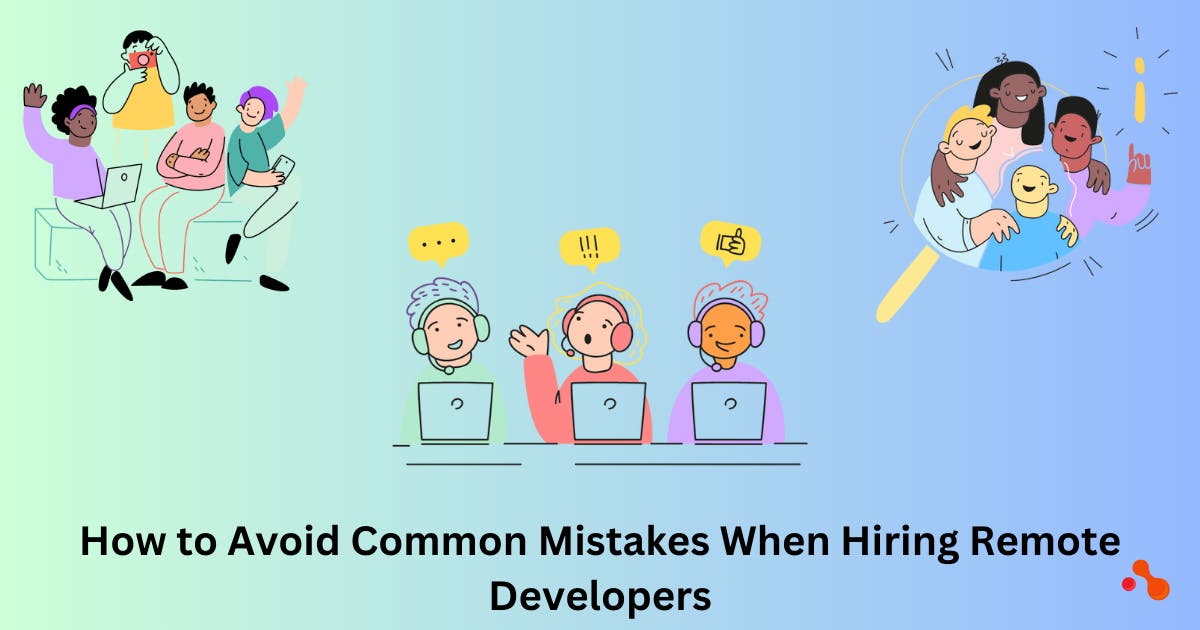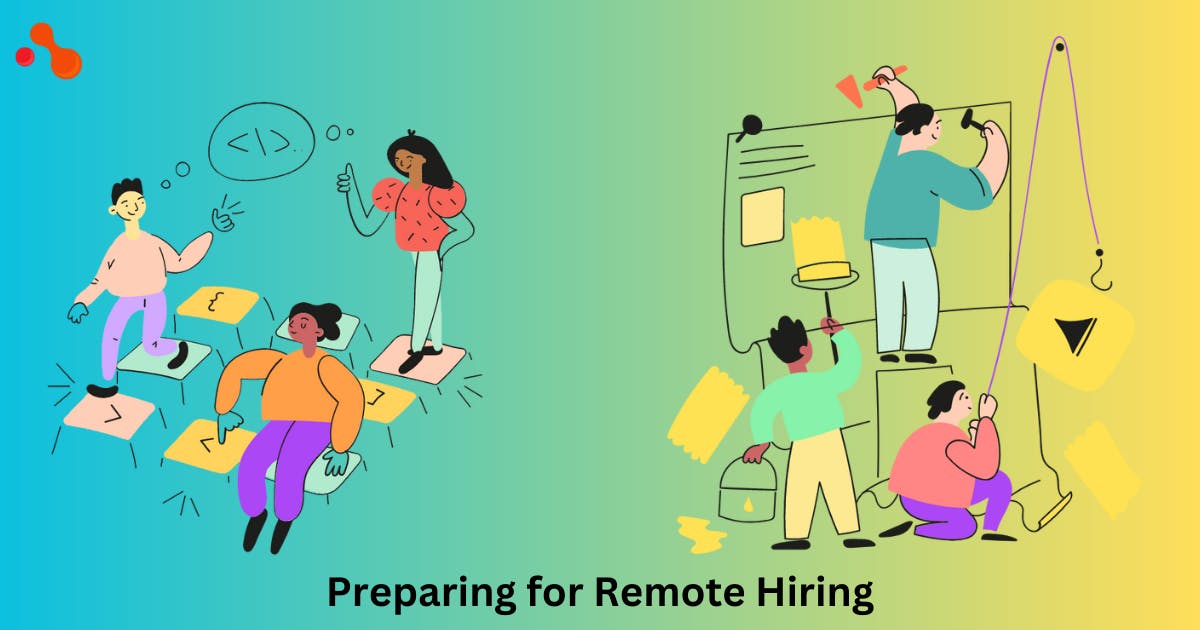How to Avoid Common Mistakes When Hiring Remote Developers
Introduction
In today's digital age, the way we work is constantly evolving. One significant shift that has gained immense popularity is hiring remote developers. But what exactly does it mean to hire remote developers? Well, imagine building a team of talented individuals who work from different parts of the world, collaborating virtually to create innovative software and applications. That's the essence of hiring remote developers!

Hiring remote developers has skyrocketed in popularity due to its numerous advantages. Let's take a closer look at why it has become such a hot trend:
Preparing for Remote Hiring
In today's digital age, hiring remote developers has become increasingly popular. hire remote developers allows companies to tap into a global talent pool and overcome geographical limitations. Several key steps are needed to ensure a successful remote hiring process.

Define Required Skills and Qualifications:
Identify the specific technical skills and qualifications needed for the role. For example, if you're hiring developers, you may require expertise in programming languages like Python or Java.
Determine the level of experience required, such as junior, mid-level, or senior.
Consider any additional skills or certifications relevant to the job, such as familiarity with specific frameworks or tools.
Job Descriptions and Expectations:
Craft a clear, detailed job description highlighting responsibilities, goals, and deliverables.
Clearly state whether the position is remote or offers a hybrid work arrangement.
Specify the working hours or time zone requirements, if applicable.
Communicate the expected outcomes and performance metrics to set clear expectations.
Assess Cultural Fit and Communication Skills:
Cultural fit is crucial for a remote team to collaborate effectively. Consider the following:
Include interview questions assessing the candidate's ability to work well remotely.
Assess their communication skills, both written and verbal, as effective remote communication is vital.
Evaluate their ability to work independently and manage their time effectively.
Consider any previous experience the candidate may have had with remote work.
Create an Effective Remote Hiring Strategy:
Utilize appropriate platforms and tools for the hiring process, such as video conferencing and collaboration software.
Conduct virtual interviews to assess candidates' skills, cultural fit, and communication abilities.
Implement technical assessments or coding challenges to evaluate candidates' technical proficiency.
Consider trial periods or freelance projects to assess candidates' performance before committing long-term.
Provide clear guidelines and instructions for remote onboarding and training processes.
Example: Let's say you're hiring a remote developer for a software company. Here's a simplified remote hiring strategy:
Step 1: Define the Required Skills and Qualifications:
Expertise in JavaScript, React, and Node.js.
Minimum 2 years of experience in web development.
Familiarity with Git version control system.
Step 2: Job Description and Expectations:
Develop scalable and maintainable web applications using JavaScript, React, and Node.js.
Collaborate with the team to meet project deadlines and deliver high-quality code.
Full-time remote position with flexible working hours.
Step 3: Assess Cultural Fit and Communication Skills:
Conduct virtual interviews to evaluate the candidate's remote work experience and ability to communicate effectively in a distributed team.
Assess their problem-solving skills and ability to work autonomously.
Step 4: Create an Effective Remote Hiring Strategy:
Utilize video conferencing tools for interviews.
Assign a coding challenge to assess technical proficiency.
Offer a short freelance project to evaluate performance and collaboration skills.
Provide remote onboarding and access to necessary collaboration tools.
By following these steps and tailoring them to your specific needs, you can establish a successful remote hiring strategy for hire developers or any other remote role.
Avoiding Mistakes During the Hiring Process
When hiring developers, it's essential to avoid common mistakes that can lead to hiring the wrong person for the job. In this section, we'll discuss some key strategies to make the hiring process more effective and increase the chances of finding the right fit for your team, including how to hire remote developers.

Screening and interviewing mistakes:
Rushing through the screening process: Take your time to thoroughly review resumes and applications to identify potential candidates who meet the necessary qualifications.
Ignoring important criteria: Clearly define the skills and qualities you're looking for in a developer and use them as a guideline during the screening process.
Failing to ask the right questions: Prepare a list of interview questions that assess the candidate's technical skills, problem-solving abilities, and cultural fit within your organization.
Thorough background checks and references:
Verify the candidate's employment history, educational background, and any certifications they claim to have.
Contact references provided by the candidate to gain insights into their work ethic, team collaboration, and overall performance.
Conduct background checks to ensure no red flags might affect the candidate's suitability for the role.
Technical assessments and coding tests:
Administer technical assessments or coding tests to evaluate the candidate's proficiency in programming languages and problem-solving abilities.
Provide realistic coding challenges or projects that reflect the tasks they will encounter on the job to gauge their practical skills.
Assess not only their technical capabilities but also their approach to problem-solving, creativity, and attention to detail.
Structuring effective remote interviews:
Schedule video interviews to simulate face-to-face interactions, even when hire remote developers.
Test the candidate's communication skills and ability to work independently in a remote environment.
Use screen-sharing and collaborative tools to remotely assess their technical skills and problem-solving capabilities.
Involving key stakeholders:
Include team members who will closely work with the new developer in the interview process.
Their input can help assess the candidate's fit within the team dynamics and ensure alignment with the company culture.
Involving key stakeholders in the hiring process fosters a sense of ownership and accountability within the team.
For example, let's consider hiring a remote developer for a mobile app development project:
During the screening process, carefully review resumes to identify candidates with experience in mobile app development, proficiency in programming languages like Java or Swift, and a track record of successfully delivering similar projects.
Conduct video interviews with shortlisted candidates to evaluate their communication skills, problem-solving approach, and experience working remotely. Use screen-sharing to assess their ability to navigate mobile development tools and discuss code implementation.
Involve the project manager and senior developers in the final interview round to ensure they can effectively collaborate with the potential remote developer and contribute to the decision-making process.
By following these strategies, you can improve your chances of hiring the right developer, whether they work remotely or in an office environment. Remember, it's essential to take your time, involve the right people, and thoroughly assess the candidate's skills and qualifications before making a final decision.
Ensuring Successful Onboarding and Collaboration
Managing a diverse remote team can present certain challenges. However, by implementing the following strategies, you can overcome these challenges and ensure the success of your team:

Addressing potential challenges in managing a diverse remote team:
Language barriers: Encourage team members to use clear, concise language, avoiding jargon or complex terms. Provide language resources or translation tools to facilitate communication.
Time zone differences: Establish common working hours or overlapping periods to enhance collaboration. Utilize scheduling tools to coordinate meetings and ensure everyone's availability.
Cultural differences: Promote cultural awareness and sensitivity within the team. Encourage open discussions about cultural practices and traditions to foster understanding and respect.
Developing effective remote communication and collaboration practices:
Clear communication channels: Establish a centralized communication platform like Slack or Microsoft Teams to ensure everyone can easily connect and share information. Encourage regular updates and provide guidelines for effective communication.
Video conferences: Conduct regular conferences to enhance team bonding and facilitate face-to-face interactions. Visual cues and body language can help improve understanding and build stronger relationships.
Project management tools: Utilize project management software, such as Trello or Asana, to assign tasks, track progress, and promote transparency within the team. This allows everyone to stay organized and accountable.
Celebrating diversity and recognizing achievements:
Employee spotlights: Highlight individual achievements and contributions through regular newsletters or team meetings. Showcase team members' talents and successes, creating a positive and inclusive environment.
Virtual team-building activities: Organize virtual events like trivia contests, online games, or virtual coffee breaks to foster camaraderie and teamwork. These activities help bridge the distance and create opportunities for team bonding.
Inclusive recognition programs: Implement recognition programs that celebrate diverse achievements. Ensure the recognition is inclusive and considers various cultural backgrounds, languages, and work styles.
Your remote team can succeed by addressing potential challenges, developing effective communication practices, and celebrating diversity. Remember, embracing diversity enriches your team's perspective, leading to innovative ideas and increased productivity.
Conclusion
In conclusion, it is crucial to remember a few key points when hire developers remotely. First and foremost, avoiding mistakes is vital. We can prevent hiring blunders by carefully reviewing resumes, conducting thorough interviews, and checking references. It is also important to implement effective strategies throughout the hiring process. For instance, video interviews and skill assessments can help assess candidates' abilities accurately. Embracing a successful remote hiring strategy offers numerous benefits. It enables us to tap into a global talent pool, accessing skilled developers from various parts of the world. This diversity brings our teams fresh perspectives, creativity, and innovation, ultimately leading to better outcomes. So, let's avoid mistakes, implement smart strategies, and unlock the advantages of hiring remote developers.
